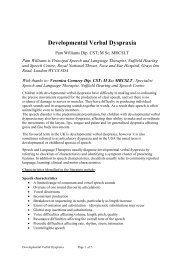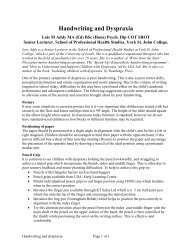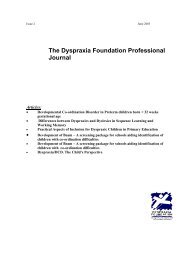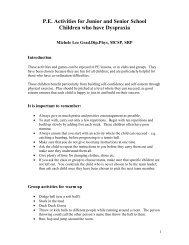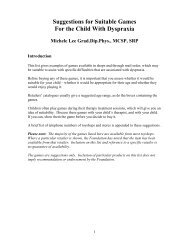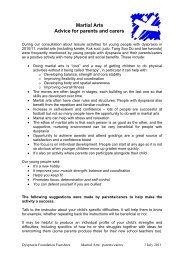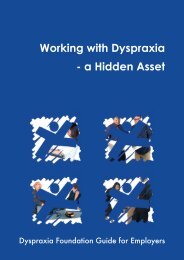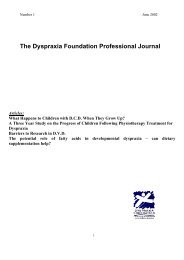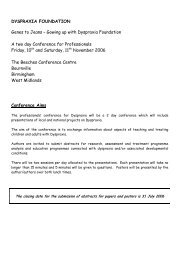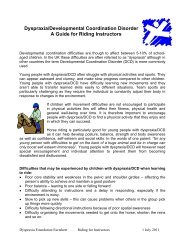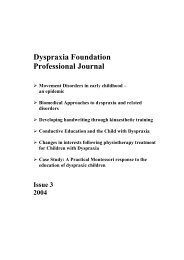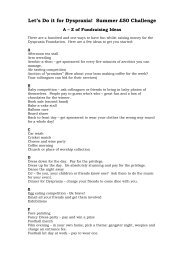Seeing Your Way Through: - Dyspraxia Foundation
Seeing Your Way Through: - Dyspraxia Foundation
Seeing Your Way Through: - Dyspraxia Foundation
Create successful ePaper yourself
Turn your PDF publications into a flip-book with our unique Google optimized e-Paper software.
Is your child being bullied<br />
Children often find it difficult to talk about being bullied. Many bullies threaten children not to<br />
tell and the embarrassment of the whole school knowing can also influence their decision to keep<br />
quiet. As Valerie Besag, one of the UK’s leading authorities on bullying writes, “Given that<br />
many bullied children find it difficult to approach their parents for help, the optimum situation<br />
must be that all parents are alerted to the possibility of bullying occurring, be made aware of the<br />
warning signs and be encouraged to approach the school should they suspect anything<br />
untoward.”<br />
Sometimes sudden behaviour changes may indicate that a child is being bullied. Some of these<br />
are detailed below, but these are not definite indicators. Please bear in mind that there may be<br />
other causes:<br />
• Behaviour problems. The child may become quiet and withdrawn, spending most of their<br />
time playing computer games or watching television. They may no longer wish to take part<br />
in social activities and may resent any small criticism. A request to tidy their room may<br />
result in floods of tears and “you’re always picking on me, never anyone else!” Sometimes<br />
they may take their angry feelings out on their siblings or friends. They may pick fights,<br />
stop sharing or overreact to normal situations. They may be forced to steal by bullies who<br />
threaten them with violence if they don’t regularly give them money, or they may<br />
desperately want to be accepted so they join a gang that won’t<br />
accept them unless they<br />
steal or break the law in some other way.<br />
• School problems. Children sometimes refuse to go to school or will develop tummy or<br />
headaches rather than go to school or attend particular lessons. They may be so worried<br />
about the bullying that they can’t concentrate on school and homework. Their books may<br />
be damaged or lost or their money may go missing. They may offer the bully presents to<br />
leave them alone and say they lost them.<br />
• Night problems. They may have nightmares and may shout out in their sleep things like<br />
“No, leave me alone”. They may begin wetting the bed, possibly indicating that they are<br />
worried about something. Disturbed sleep patterns will mean the child is tired in the<br />
mornings and this makes getting them to school even more difficult.<br />
• Injuries. Physical bullying may leave bruises, the child may try to explain them, but it may<br />
be useful to check if the school are aware of any incidents. Frequent bruising should<br />
always be queried.<br />
• Low self-esteem. Verbal bullying can make a child worry about any aspect of his<br />
appearance. A child called ‘teacher’s pet’ may deliberately fail at school, while another<br />
may become obsessive about washing after being called ‘smelly’. Children can become<br />
dependent and act babyish. They may revert to thumb sucking, biting nails, overeating,<br />
under eating, stammering or chewing things like hair or clothes. They may become tearful,<br />
tired all the time and depressed.<br />
• A child who talks about not wanting to live or suicide should always be taken<br />
seriously and needs urgent help. Forcing them to go to school will only make<br />
the situation worse.<br />
Bullying – A guide for parents Page 2 of 6



